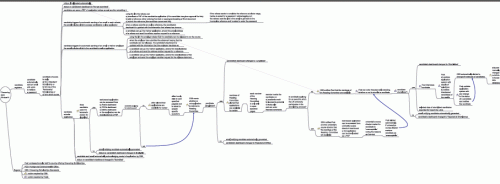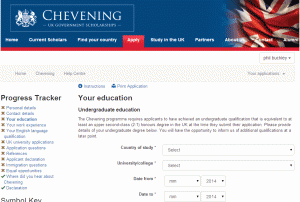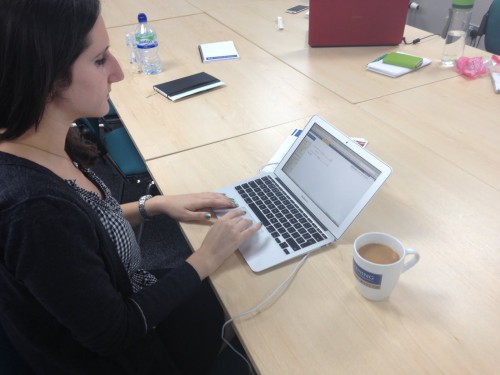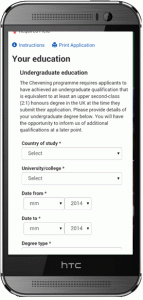11th August 2014 London, UK
Transforming the Chevening Scholarship application system

Hello there, I’m Phil Buckley, a Digital Transformation Manager at the Foreign Office. On 1 August we released a new application form for the Chevening scholarship programme and I wanted to tell you a little more about it.
Why we had to change the system

I mentioned in my post introducing Service Transformation at the Foreign Office that the old system was now 9 years old and was really showing its age; in fact,even our supplier no longer wanted to support it as it was on such old servers.
I joined the Digital Transformation Unit in February and the new scholarship round was due to open on 1 August: we had to get a new system working, and fast.
Our options for changing it
When you build a new web application, there is normally a decision point as to whether to build the software from scratch, or to buy some pre-written software and customise it where necessary.
As the Digital Transformation Unit is too small to have any in-house developers, we would always be going down the ‘buy’ route (we used the G-Cloud procurement system). However, even here we faced a choice between software houses who would build us a brand-new system, and those who said they had some customisable software which could do the job and which we could license.
The Chevening application process is tough and complicated – candidates have to go through 4 different sifts, panels of eminent academics discuss their prospects while sitting in different countries, and finally the candidates get grilled in face-to-face interviews in embassies around the world.

Despite this sounding like a very unusual system, and despite some excellent software houses tendering to build a bespoke system. In the end we decided to go with a company called WCN, who provided an off-the-shelf piece of software which we could customise.
WCN are actually specialists in recruitment solutions: it turns out that many firms require similar numbers of hoops to go through, at a similar level of complexity, when they recruit graduates or senior members of staff. So, with our branding and our process implemented, applicants will go through a system which has already been tested by thousands of applicants across the world; but for our successful candidates, instead of getting a job with one of WCN’s other clients such as JP Morgan or John Lewis, they will get to do a Masters in Economic Development at Glasgow (or similar).
How we made the choice
When we did the procurement, we weighted our ratings so that the most important factor was quality: this will be the first experience of the UK for many talented people, and we wanted to make the right first impression. However, because we were able to buy what was essentially a commodity, the costs are also very good: not only is the new system a substantial improvement on the old, it is cheaper to run as well.
Product improvements

One of the best things about the new Chevening system is that it is now responsive, meaning that it works well on mobile phones as well as desktops. It may be that not many people write their applications on a mobile phone, but mobile is the primary means of accessing the internet for many developing countries so some people may wish to; and even if you apply on a desktop, you will be able to check the status of your application on your phone and we expect many people to want to be able to do that. We will certainly be watching these statistics very closely.
The old (left) and new (right) Cheev application form on smartphones
Cost improvements
Including building the new system, over the duration of the contract it will be around 20% cheaper to run the new system than to have continued with just the service charges we were paying our previous supplier (if continuing with them had been possible).
Chevening is not the biggest piece of software ever written, so the numbers aren’t that huge; but another way to look at it is that this might mean we can afford 1 extra scholarship per year. Depending on your perspective, this may or may not sound like a big deal; it will certainly be important to the candidate in question.
Transforming the business as well as the website
As Mike Bracken, the head of GDS notes, service transformation is more than simply putting the same old forms online, and we have made sure that we improve the process as well as our website:
- Users can optionally give us their Skype contact details – in some cases, particularly in conflict zones such as South Sudan, we will use Skype for interviews.
- We used to send actual paper letters to candidates; all communications are now handled electronically.
- We integrate with the Prospects database which tells you which international degrees are of comparable quality – this allows us to get much better management information about the backgrounds of successful scholars and reduces the workload for assessment staff.

(Note that all these productivity improvements are not yet included in the cost-saving figures I gave earlier as we are still trying to quantify them fairly.)
There is room for further transformation, and among other things we are considering:
- Allowing scholars to take pictures of their supporting documents on their smartphones rather than only accepting PDF scans.
- Directly integrating with the English Language test providers: this will save time for candidates and give us verified results.
What is next for the FCO services?
Making a web service is a team effort, and getting this website out on time would have been completely impossible without the excellent work and fantastic dedication of both our suppliers WCN, and also the staff of the Association of Commonwealth Universities (ACU) who administer the Chevening Scholarships and with whom we have worked throughout the process. They have both done an amazing job.
From here, we will certainly be monitoring how it goes down with users; the ACU had excellent insights from previous applicants and this helped inform the design of the new system. I will write another blog shortly on testing the new Chevening site with current scholars: it was fun, challenging, and took place in every accent of English under the sun, but it did include a free bar.
It will also be worth monitoring how many other government departments need a similar system. For this first instance, the decision to license someone else’s work made very good sense. However, if we begin to discover 5 or more similar cases across government, we should considering the case for building our own.
Let me know your thoughts, and the very best of luck to any scholar thinking of applying.
Follow Phil at @philbuckley5



Hi Ifeanyichukwu-
Thanks for your interest here. My next blog post on user research is at https://blogs.fcdo.gov.uk/philipbuckley/2014/09/01/user-research-on-the-new-chevening-application-system/.
Best wishes –
Phil
Dear Mr. Phil,
The website is achieving its purpose, I think. Thank you for writing the “Transforming the Chevening Scholarship application system” blog, it is very helpful to me in understanding how the website works coupled with other important application insights. You promise to write another blog shortly “I will write another blog shortly on testing the new Chevening site with current scholars:…” How can I lay my hand on it for more insights?
Greetings Phil,
Hope this note finds you well! I am interested in studying how Chevening scholarship system works and this article was very helpful. Thank you for sharing it. I am having trouble to enlarge the simplified Chevening scholarship application process so i can read it. Is there a way you can attach it in the comments or send it via email? It would be very helpful for me!
Thank you and looking forward to hearing from you!
Best
Linda
Hi Linda, thanks for getting in touch.
My blog post is a little old, and the application process has been improved since that diagram! The best place to see the current process is at http://www.chevening.org/apply/application-timeline – it has been simplified quite a bit as you will see.
Hope that is of use, best wishes –
Phil
Hi Peace, thank you for your comment!
With thanks to the ACU here –
If you head to chevening.org/apply, you need to fill in the red box at the top with your country and level – normally a scholarship.
Once there, you will get to the Nigeria page which will tell you about the available scholarships, at the bottom of which is a light red button marked apply.
I hope that is of use, there’s plenty more information at http://www.chevening.org/apply/faqs if you need it.
Good luck if you decide to apply!
Phil
Hi Phil,
I am a Nigerian and I cant seem to find the button that takes me to the application page. Is the scholarship country specific?when I go through the official website and I see the apply option, I click on it and it takes me through the steps,eligibility,etc and I have read them over and over but can’ t seem to find that option that will allow me start the application process. Anytime I click on apply it keeps taking me back to read the steps, eligibility,etc .Is there something I am not doing well or is there another link for the application as I would have thought anything I am looking for concerning this scholarship should be on the official website. Will sincerely appreciate your help. Thanks.
Hi Listiyani, thanks for getting in touch.
With thanks to the Association of Commonwealth Universities (ACU) for this answer.
A number of candidates have had this problem, so today you and they should have been emailed the chance to go in and make some corrections. Can I ask you to try this please? If you are still struggling, please get in touch with the ACU directly from their contact page at http://www.chevening.org/enquiry/.
With best wishes-
Phil
Hi Phil,
After I’ve submitted my application and one of my two referees sent her response to Chevening, I can no longer do any revision toward either my university application and my referee list. Is this the web automatic mechanism? I found this is somehow inconsistent with several statements I’ve read earlier in the web that we can still edit our application even after submission.
Regards,
Listiyani
Dear Andrew Arim
Thank you very much for this feedback; yes, you appear to have discovered a place where the database isn’t quite up to date.
I’ve just spoken to the ACU and they will get this updated – would you mind checking back again next week please? If you still can’t see the course, feel free to raise with the ACU directly on http://www.chevening.org/enquiry/.
Best wishes and thanks again for getting in touch –
Phil
Dear Phil Buckley;
I am a Ugandan currently working in South Sudan. I got admission to university of Aberdeen for MSc Oil and Gas Computing, unfortunately during the application process in the eChevening System, i could not find it on the drop down list. This made me to opt for MSc IT for the Oil and Gas Industry since Oil and Gas is a priority area for Uganda. My complaint here is; the system is somewhat limiting-it kind of needs some in-house readjustment. How can you advise?
Hello Sumrin, thank you for getting in touch. The rules around the application form are actually set by the Association of Commonwealth Universities who administer the programme, but they tell me –
> The 300 word limit was arrived at after lots of experience of judging personal statements as fairly as possible – I’m afraid that editing your career highlights down to 300 words is part of the challenge!
> The Prospects database is not quite the requirement – with apologies that this isn’t particularly clear in my post, the requirement is for candidates need to have a 2:1 degree.
The Prospects database is a list of degrees from countries around the world which are equivalent to a 2:1 degree in the UK. It is still possible to apply for a Chevening scholarship with a degree which is not in the Prospects database: you can select this as an option on the relevant page. However, you must have a degree to qualify for a scholarship.
I hope that is of use– best wishes and thanks for writing –
Phil Buckley
Hi, Mr. Buckley,
I am concerned about the word limit of 300, on the personal statment and other essays. I believe it is too brief to explain an individual’s life transitions. Also the use of Prospects database is likely to eliminate people who do not posses degrees from prestigious institutions but have shown exceptional leadership skills in their personal lives.